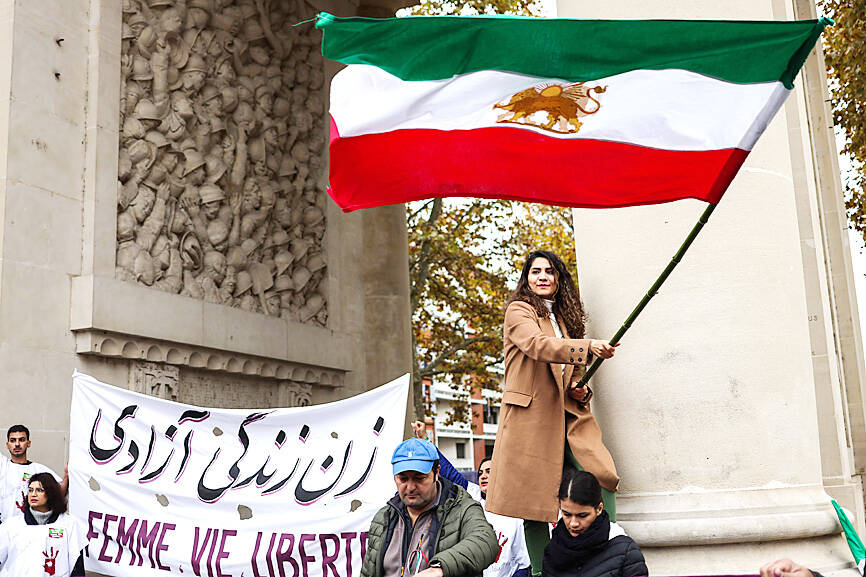An Iranian lawmaker on Sunday said that Iran’s government is “paying attention to the people’s real demands,” state media reported, a day after a top official suggested that the country’s morality police whose conduct helped trigger months of protests has been shut down.
The role of the morality police, which enforces veiling laws, came under scrutiny after a detainee, 22-year-old Mahsa Amini, died in its custody in mid-September. Amini had been held for allegedly contravening the Islamic republic’s strict dress codes. Her death unleashed a wave of unrest that has grown into calls for the downfall of Iran’s clerical rulers.
On Saturday, Iranian Attorney General Mohammad Jafar Montazeri said the morality police “had been closed,” the semi-official news agency Iranian Students’ News Agency (ISNA) reported. It did not provide details, and state media have not reported such a purported decision.

Photo: AFP
In a report carried by ISNA on Sunday, Iranian lawmaker Nezamoddin Mousavi signaled a less confrontational approach toward the protests.
“Both the administration and parliament insisted that paying attention to the people’s demand that is mainly economic is the best way for achieving stability and confronting the riots,” he said, following a closed meeting with several senior Iranian officials, including Iranian President Ebrahim Raisi.
Mousavi did not address the reported closure of the morality police.
The Associated Press has been unable to confirm the current status of the force, established in 2005 with the task of arresting people who contravene the country’s Islamic dress code.
Since September, there has been a reported decline in the number of morality police officers across Iranian cities and an increase in women walking in public without headscarves, contrary to Iranian law.
Montazeri provided no further details about the future of the morality police or if its closure was nationwide and permanent.
However, he added that Iran’s judiciary would “continue to monitor behavior at the community level.”
In a report by ISNA on Friday, Montazeri was quoted as saying that the government was reviewing the mandatory hijab law.
“We are working fast on the issue of hijab and we are doing our best to come up with a thoughtful solution to deal with this phenomenon that hurts everyone’s heart,” Montazeri said, without offering details.
Saturday’s announcement could signal an attempt to appease the public and find a way to end the protests in which, according to rights groups, at least 470 people were killed.
More than 18,000 people have been arrested in the protests and the violent security force crackdown that followed, said Human Rights Activists in Iran, a group monitoring the demonstrations.
Ali Alfoneh, a senior fellow at the Arab Gulf States Institute in Washington, said that Montazeri’s statement about closing the morality police could be an attempt to pacify domestic unrest without making real concessions to protesters.
“The secular middle class loathes the organization [morality police] for restricting personal freedoms,” Alfoneh said.
On the other hand, the “underprivileged and socially conservative class resents how they conveniently keep away from enforcing the hijab legislation” in wealthier areas of Iran’s cities, he said.

Thousands gathered across New Zealand yesterday to celebrate the signing of the country’s founding document and some called for an end to government policies that critics say erode the rights promised to the indigenous Maori population. As the sun rose on the dawn service at Waitangi where the Treaty of Waitangi was first signed between the British Crown and Maori chiefs in 1840, some community leaders called on the government to honor promises made 185 years ago. The call was repeated at peaceful rallies that drew several hundred people later in the day. “This government is attacking tangata whenua [indigenous people] on all

The administration of US President Donald Trump has appointed to serve as the top public diplomacy official a former speech writer for Trump with a history of doubts over US foreign policy toward Taiwan and inflammatory comments on women and minorities, at one point saying that "competent white men must be in charge." Darren Beattie has been named the acting undersecretary for public diplomacy and public affairs, a senior US Department of State official said, a role that determines the tone of the US' public messaging in the world. Beattie requires US Senate confirmation to serve on a permanent basis. "Thanks to

UNDAUNTED: Panama would not renew an agreement to participate in Beijing’s Belt and Road project, its president said, proposing technical-level talks with the US US Secretary of State Marco Rubio on Sunday threatened action against Panama without immediate changes to reduce Chinese influence on the canal, but the country’s leader insisted he was not afraid of a US invasion and offered talks. On his first trip overseas as the top US diplomat, Rubio took a guided tour of the canal, accompanied by its Panamanian administrator as a South Korean-affiliated oil tanker and Marshall Islands-flagged cargo ship passed through the vital link between the Atlantic and Pacific oceans. However, Rubio was said to have had a firmer message in private, telling Panama that US President Donald Trump

RIGHTS FEARS: A protester said Beijing would use the embassy to catch and send Hong Kongers to China, while a lawmaker said Chinese agents had threatened Britons Hundreds of demonstrators on Saturday protested at a site earmarked for Beijing’s controversial new embassy in London over human rights and security concerns. The new embassy — if approved by the British government — would be the “biggest Chinese embassy in Europe,” one lawmaker said earlier. Protester Iona Boswell, a 40-year-old social worker, said there was “no need for a mega embassy here” and that she believed it would be used to facilitate the “harassment of dissidents.” China has for several years been trying to relocate its embassy, currently in the British capital’s upmarket Marylebone district, to the sprawling historic site in the